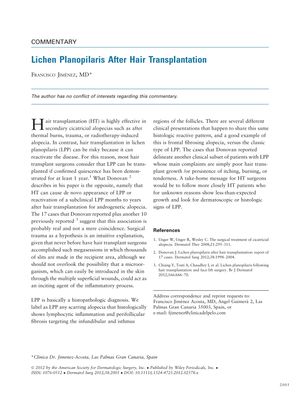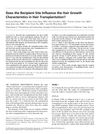Commentary: Lichen Planopilaris After Hair Transplantation
December 2012
in “
Dermatologic Surgery
”

TLDR Hair transplants can risk reactivating lichen planopilaris, a scarring hair loss condition.
In the commentary from December 2012, Francisco Jiménez, MD, discusses the risks associated with hair transplantation (HT) in patients with lichen planopilaris (LPP), a type of scarring alopecia. While HT is effective for secondary cicatricial alopecias, such as those caused by burns or radiotherapy, it can be risky for LPP because it may reactivate the disease. Surgeons generally agree that HT should only be performed on LPP patients if the disease has been inactive for at least one year. However, Donovan's paper reported 17 cases where HT appeared to cause a new onset or reactivation of LPP, adding to 10 previously reported cases, suggesting a real association between HT and LPP. The commentary suggests that surgical trauma from the procedure or the introduction of microorganisms could be potential causes for this reactivation. Jiménez emphasizes that HT surgeons should closely monitor patients with less-than-expected hair growth after the procedure for dermatoscopic or histologic signs of LPP.



